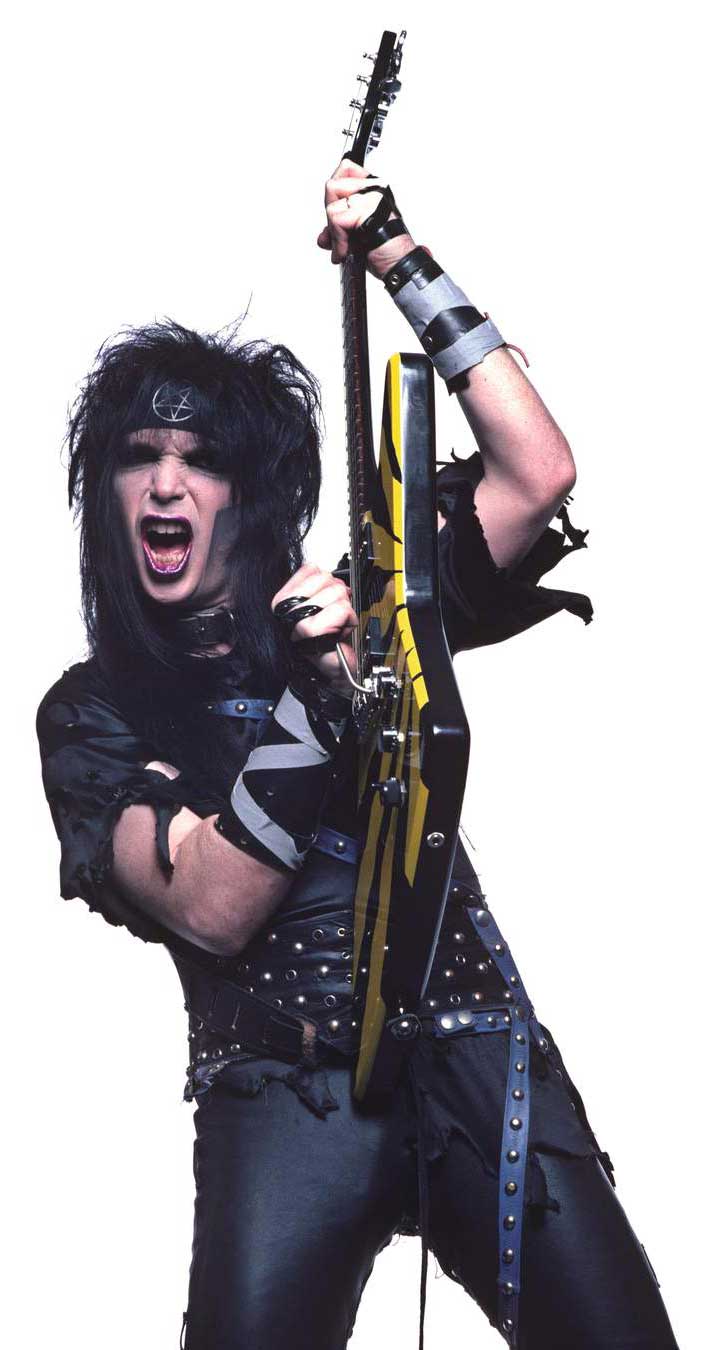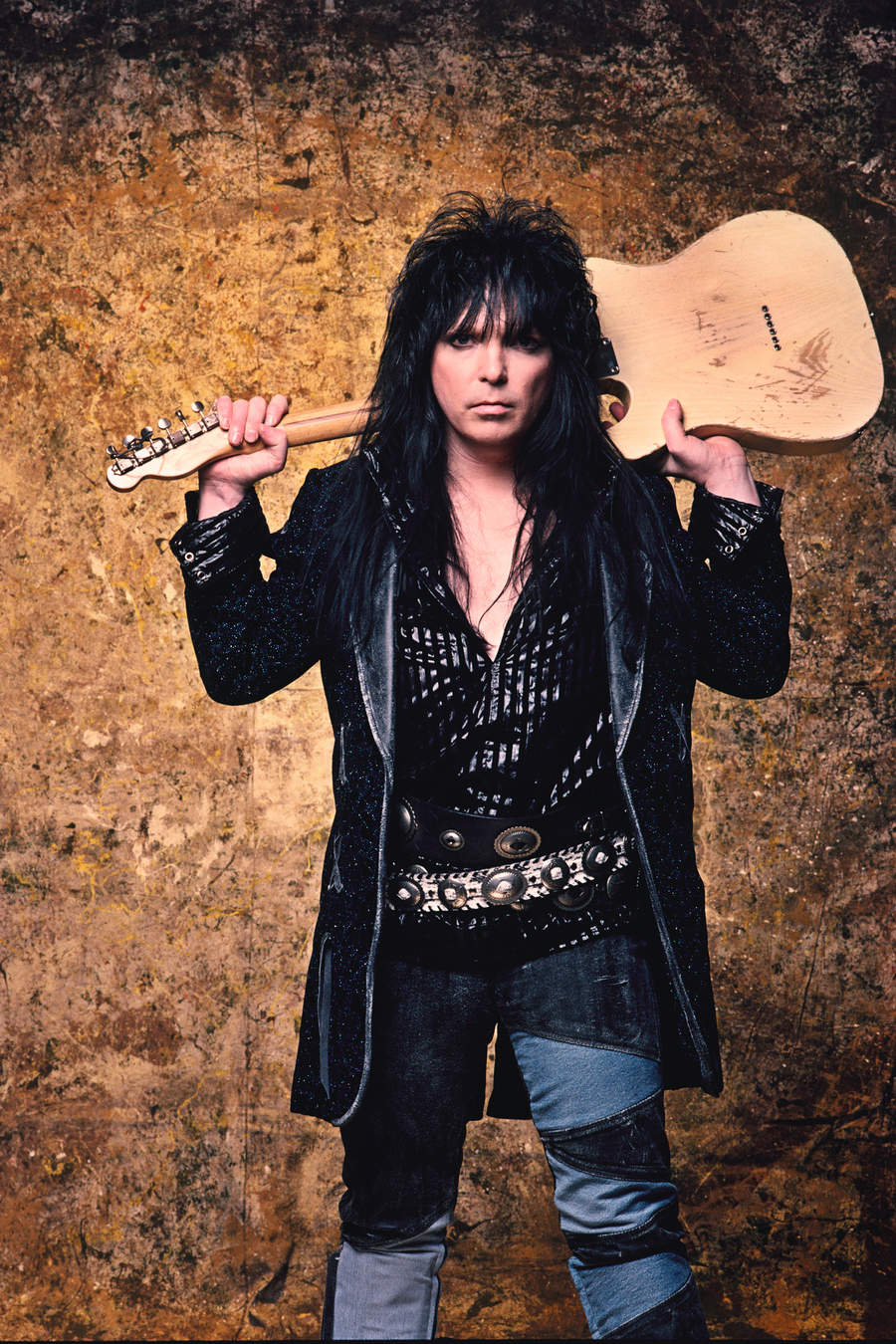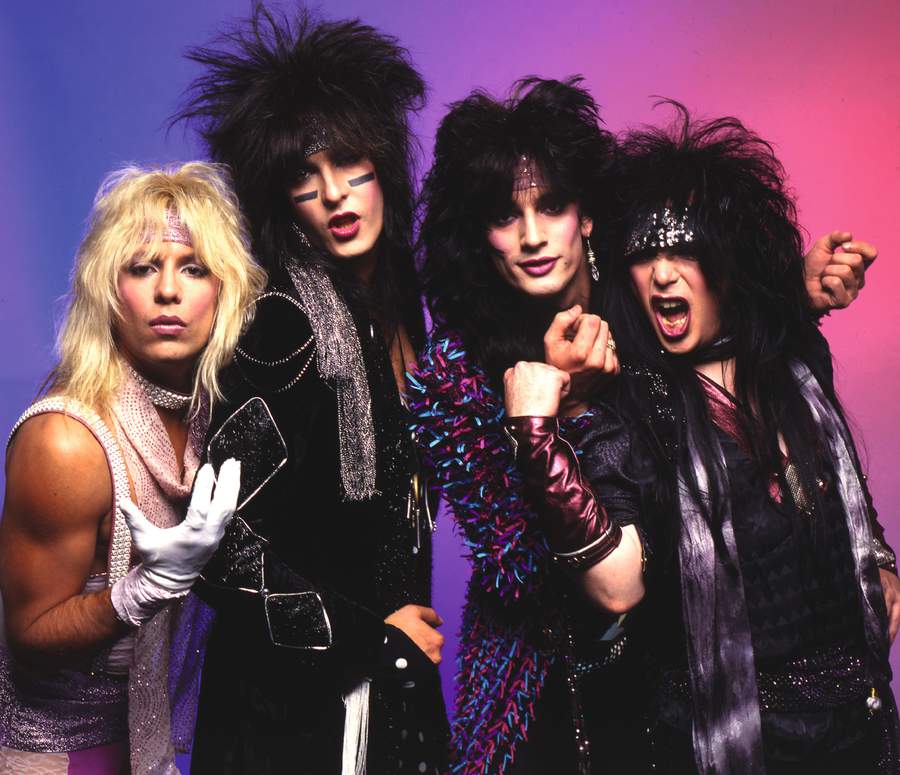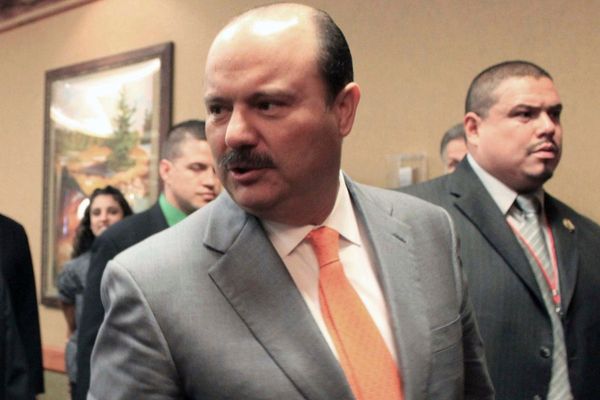
Years ago, guitarist Mick Mars read a review of a gig by his band Mötley Crüe that stuck in his mind. It wasn’t what the journalist wrote about the show that stood out, it was what they wrote about him.
“It said: ‘Mick Mars comes out to the front of the stage with his little troll body,’” he recalls. Other people might have been offended by that, but not the guitarist. “I thought: ‘Cool!’ It sounded creepy.” He laughs. “I’m the little goblin guy.”
What the reviewer didn’t mention, or more likely didn’t know, was that in his twenties Mars had been diagnosed with ankylosing spondylitis (AS), a genetic condition that over time fuses bones in the body together.
“What I have now is bamboo spine,” he says, referring to his spine now effectively being one single bone – something borne out by his rigid posture and the occasional grimaces of discomfort during our chat.
Yet despite his physical condition, he’s funny, wry and far more self-deprecating and egoless than any man who spent 42 years as member of Mötley Crüe should be. In many ways, Mars – born Robert Alan Deal in Indiana in 1951 – was an unlikely 80s-metal superstar. He was 29 and had already been around the block several times when his future bandmates responded to an ad he’d placed in local newspaper The Recycler in which he described himself as a “loud, rude and aggressive guitar player”.
But it was Mars who helped get the band off the ground, via financial backing from a mysterious benefactor he refers to today only as “Alan”. And it was Mars, hunched and glowering, who brought a malevolent edge to the Crüe’s cartoon glam-metal pirate ride. He can’t talk about last year’s messy departure from the band, amid claims and counter-claims of backing tape use and general inability to play. This is partly due to impending litigation, but also partly due to an unspoken sense that he’s still hurt by it.
Instead, his attention is focused on his imminent and long-gestating debut solo album, The Other Side Of Mars. Co-written with former Winger keyboard player Paul Taylor, it’s a blast of melodic yet surprisingly convincing modern metal. Not that the man behind it is about to toot his own horn.
“My number-one rule has always been never, ever believe your own hype,” he says. “That will wreck everything.”

When did you decide to make a solo album?
A long time ago. When we did the final tour [in 2016, which turned out not to be the final tour] was when I really started dedicating myself to coming up with a solo record. But it kind of got stopped. I didn’t like the direction it was going. I said: “No, it’s gotta be more than that.” It came together a little slow, but it was growing – crunchy songs, cinematic songs. It’s not progressive rock, but it’s progressing me. I’ll never be able to do what Steve Vai or any of those guys do. I’m just me. I play very simple stuff.
Who made you want to pick up the guitar in the first place?
Way, way, way back, when I was maybe three or four years old and we lived in Huntington, Indiana, we went to a fair. This guy named Skeeter Bond happened to be playing. He had this bright orange suit with sequins and stuff, he was wearing a big white Stetson, the old country-and-western thing. He got up there and did this stuff. I was, like: “Wow, that’s what I wanna do.”
When was the first time you played guitar on stage?
I had a school band that I did in junior high school, right around the seventh or eighth grade. There was this talent show thing, so I borrowed my cousin’s electric guitar and this teeny-tiny amp, and wrote a surf song called Conflict.
Did you win the talent show?
Heck no. They couldn’t even hear me. They were sitting five feet away, going [cups ear, mimes straining to listen]. The first band I played a gig with was The Jades. We copied a lot of British Invasion stuff. It was when bands still had ‘The’ in front of their name – The Beatles, The Stones. The Jades…
What were the teenage Mick Mars’s ambitions? Were you fixated on becoming a successful musician?
I went through surf music and British Invasion, and then I discovered blues and jazz. All the drummers in those days were into jazz, so I thought, okay, I‘ll listen to some jazz. I listened to Wes Montgomery, Miles Davis, all those people, just learning a lot of different ways of doing things and different kinds of music. And stumbling on King Crimson and Gentle Giant was pretty eye-opening for me.
When I heard [King Crimson guitarist] Robert Fripp, and the way that he played, I went: “How can you do that and do it so fast?” It was so different. Everybody knows 21st Century Schizoid Man, but when you hear something like Cat Food [from 1970’s In The Wake Of Poseidon] you go, this is really off, but it’s so cool.

Did you ever have your own progressive rock phase?
I listened to it. I couldn’t grasp it. Well I could grasp it, but I couldn’t do it. I went to see Gentle Giant in California, and you’ve got them lined up across the stage, Kerry Minnear here and Gary Green there, and they’d go: ‘da-da-da-da-da-da’ and it would go straight across the stage – this guy plays three notes, this guy plays four notes, this guy plays one note. My jaw dropped. I was thinking: “How do you do that?” But I loved it because I couldn’t do it.
What kind of guy were you then?
I did my share of partying, but I’d stay out of trouble and play my guitar instead of being a clown. I was kind of a comedian, but I was never the dominant person in a roomful of people, never a ‘Look at me!’ kind of person. But I liked to laugh and have fun. Everybody does. Well, not everybody, there’s some miserable bastards out there.
You had a son with your first girlfriend when you were nineteen. How hard was it to balance a young family with your rock’n’roll ambitions?
We were both on a different page. I wanted to do this, she wanted me to work. We didn’t fight, we didn’t get in arguments. We decided we weren’t a match. So I went my way and she went her way. I made my child support payments.
Before Mötley Crüe happened, you were the textbook struggling musician, playing in a string of bands in the seventies. How tough did things get?
Pretty tough. No money, living on Bennies [Benzedrine, an amphetamine] on the street, sleeping on floors using my guitar case as a pillow. One band I was in, we all lived in the same apartment. I used to sleep behind my Marshalls, using them as a wall. I used to hang out with… I don’t want to say gangs, but biker-type people. I was doing a lot of partying with those guys.
A lot of musicians must feel that void: “Is this the way it’s going for be? Am I going to do anything with my life?” What I learned is, if the chance to do something comes up, you gotta take it. You gotta keep at it. That’s what I was thinking all the time.
Did you ever come close to quitting?
Never. Not once. It was a lesson I needed to learn, I guess. I was being tested: you really want this this bad? Like the blues guys, you gotta pay your dues.

What kept you going?
Determination. I was obsessed: “I need to do this.” I wanted it so bad. No matter what the conditions were, I’m still doing this. I’d get afraid sometimes. I had a few jobs that were dangerous. I smashed my hand in one place. I was working at an industrial laundromat on the extractor, the ones that wring out the clothing in this six-hundred-pound tub. One day this tub came back and hit me in the left hand. It could have crushed my hand if it had hit a bit harder. It would have been the end of my career. I was like: “That’s it, I’m done,” and I walked out. And that night, at two o’clock in the morning, I played an after-hours show.
You were playing on the same circuit as Van Halen in their early days. Did you know Eddie Van Halen back then?
I’d known Edward since he was nineteen years old. When I first met them, they’d pretty much just got David [Lee Roth] in the band. I knew they were going to make it the first time I heard them. I was like, man, what a great band. We’d play in places like Gazzarri’s and the Golden West Ballroom. Me and the drummer from White Horse would go: “God, I hope Van Halen’s playing with us tonight, those guys kick ass.” Watching Edward grow into different areas was great.
Is it true that you almost joined Sparks before Mötley Crüe got off the ground?
What happened with that was that the guy from Sparks with the moustache [Ron Mael] called me from the ad I’d put in The Recycler. I told them straight up that it wasn’t the kind of music I played and they would be disappointed in me. They were more of a glam-rock band – David Bowie, T. Rex. I love that stuff, but I don’t play like that.
What would Sparks with Mick Mars on guitar have sounded like?
Oh, it would have been a train wreck [laughs].
Another person to answer your ad was Nikki Sixx. What did you make of him the first time you met him?
I already had ‘Mötley Crüe’ in my mind as a band name. I’d had it since 1977, maybe 1976. So I went up there and auditioned them. I liked the way Nikki was playing – no amp, just slapping around and stuff. It was pretty cool. He said: “I’ve got a drummer too.” Ironically enough, Tommy Lee had been in a band called Suite 19, and we had a mutual friend named Freddy who gave me his number when I said I was gonna put an original band together. But I lost the number, so I never met him. And now here’s this guy who I was supposed to meet a long time ago, with Nikki. When we started playing it just went ‘Wooof!’ Instant. Kind of like the same story as Cream with Clapton and those guys.

The story goes that you wanted to get rid of their original singer, O’Dean Peterson, because he was “a fucking hippie”. What was your problem with hippies?
With O’Dean it was just that I didn’t feel he was right. Not that he sang horribly, he just had a more Roger Daltrey-type voice. I told Tommy and Nikki that I wasn’t sold on O’Dean, and they were stumbling around going: “Well, whadda we do?” And I go: “That skinny kid that I saw on stage last night in Rock Candy? Did you see those girls? They were going nuts over him. Sex sells.” And they went: “Oh yeah…” So that’s how we got Vince [Neil]. He fit well.
When did Bob Deal become Mick Mars?
It was before Mötley. I was calling myself Mick Mars in a cover band called Vendetta. ‘Bob Deal’ didn’t fit. I thought: ‘Mick Mars, that’s me.’
Did you become a different person when you renamed yourself Mick Mars?
Nope. I only have one personality. Two names, one personality. I try to be pretty honest about who I am. I’m just a musician. I’m not a “look at me!” kind of person. Listen to me. You don’t have to look at me.
You were twenty-nine when Mötley Crüe started. Did it feel like it was your last roll of the dice?
No. If Mötley hadn’t panned out the way it did I would have moved on to something else. I’d still move on. I’d become stagnant if I didn’t.
What was it like being in Mötley Crüe in the early days?
There was electricity. We were feeding off each other like… I dunno, a rat with cheese. One of the first songs that came out when we were first getting together was Live Wire. There were a few that were pretty good, but when we did Live Wire we went: “Oh shit!” It went: ‘Kaboom!’
What do you remember about recording the first Mötley Crüe’s album, Too Fast For Love, in 1981?
Working with [engineer and former Accept guitarist] Michael Wagener. I’d met Michael when I was still in my cover band Vendetta. Anyway, we recorded Too Fast For Love with this bonehead who didn’t know how to record anything, and he messed it up. I told the guys about Michael, and he fixed it all up. People loved that record. Michael lives up the street from me. He did the first Mötley Crüe album, and he did this new album. He’s done my first and last records.
Were you hanging out on the Sunset Strip in the early days of Mötley Crüe?
No. Whenever I would go up to the Strip and hear the bands, I don’t think they’d got away from what was going on. They all just wanted to be Van Halen or something. When we came out, it changed – the sound of the Sunset Strip, the look and the music and the rest of it. It’s like, ‘Oh, there is different music.’ That’s how it seems, anyway.
Did you hear a lot of bands suddenly sounding like Mötley Crüe?
Yeah. Not exactly trying to copy us, but… I’m not saying that Mötley Crüe changed the world, but the sound was taking on an awareness. Mötley did well, and a lot of record companies were searching for that again. When we were going on an incline like this [draws sharp upwards line in the air] they were still like that [draws level line]. There was a lot of [jealously].
What was it like being in the eye of the hurricane? Did it screw with your head?
No. It was cool to go: “I’m finally doing it.” And it was climbing and climbing. Seeing all these people going [makes cheering noise] is pretty overwhelming. We played the US Festival in 1983, there were 300,000-plus people there. Going out on that stage and playing was just… wow.
The band toured with Ozzy in 1984. What do you remember about that?
Not much, ha! I remember Ozzy being in my room. He was pretty high. He goes: “Mick, don’t answer the door if Sharon knocks.”
And did she knock?
Oh yes. There was no way I was answering it.
Mötley Crüe took hedonism to the extreme in the eighties, but it seemed like you didn’t go as all-in as the other three. Is that accurate?
Yeah, I did live in my own little world. I’d already done what they were doing. I was a few years ahead. Did I drink? [Laughs] Quite a bit. But then I went: “Hmmm… I don’t think this is for me.”
Did you enjoy being in Mötley Crüe in the eighties?
It was two-thirds fun. There’s always that part where it’s: “Get away from me, you’re bothering me.”
What were the best bits?
Playing all these places you never, ever thought you’d play in, things escalating until they seem almost bigger than life. You’re just some guy sitting there, and people are looking at you, going: “Wow, there he is!” I remember in Mexico City being a car with bulletproof glass and there were a few hundred people surrounding it. I don’t think they realised what it was like for us.
What about the bits that weren’t so great?
Well, sometimes it was younger guys being younger guys and an older being: “I just wanna sleep.” Pouring hairspray on my door and setting it on fire, that wasn’t fun. Though it’s kind of funny now. Tommy running down a corridor naked and all these old women popping their heads out the doors. Looking back it’s funny, but at the time it’s like: “Can you guys be a little bit more mellow?”
You were diagnosed with ankylosing spondylitis in your twenties, but you started experiencing symptoms even before that. How did it impact on your life?
In my early teens my lower back would hurt Ithought it was from sunburn, crazy as that sounds. Later on it felt like somebody had come up and hit me on the back of the neck with a bat. And it really frigging hurt. I’d look around and there’d be nobody there.
Gradually it did its thing. As time went on, everything stopped. My head stopped moving, walking stiff… Not too long ago I couldn’t look at any film of myself, I didn’t like the way I was looking. It’s so hideous. You see yourself on film and go: “Oh my god, no.”
You can’t help that.
Yeah, it’s my body beating me up.
How did you cope with the AS?
It was a little difficult. I’d drown some pain in alcohol, that sort of stuff. But I ended up getting hooked on opiates. I was so badly hooked on them. I would recommend never going down that street, ever.
That was in the early 2000s. How did you end up in that place?
We were touring, and I was in a lot of pain. You couldn’t imagine how much pain. If I stood up my whole back would just go into tension, what I call a Charlie horse [a cramp]. How you get it in your leg or on your thigh, my whole body, my whole back would get like that. A lot of times I would just stay in my bed, it was very hard to get up. This particular doctor was giving me Oxycontin, and I was taking way too many, of course. They gave me Vicodin, and this particular opiate called Lortab… I got so addicted to those. I just wanted the pain to stop. That stuff’s brutal.
How did you clean up?
I went to a bunch of doctors, cos we were going back on tour. The band and the manager was helping me, because I was helpless – I’d be a hundred pounds or something, I couldn’t drive a car, I’m an addict. They came in and helped me get clean cos they needed me. I go to the doctor’s and he says: “He needs a double hip replacement.” I ended up getting one hip replaced. But the time I spent in the hospital, they ended up giving me morphine for the pain. That helped me a lot with getting off that stuff. When I got out of the hospital they gave me something that acted in the same way that a Vicodin would do but wasn’t really addictive. I’d have one, then a half, then a quarter. It took me four months to totally get off of that. It was difficult. Don’t go there.
How do you manage it now?
Advil. Only four a day. I’m not a youngster any more.
You gave forty years of your life to Mötley Crüe. Is there part of you that misses it?
It’s a difficult one to answer. I got a little too beat up touring… I wanted to do my solo thing. Do I miss touring? It’s one of those kinds of things that there’s a time to step back, and it was my time to step back.
Despite everything that’s happened with Mötley Crüe recently, are you proud of what you achieved with the band?
Absolutely. My whole studio is covered with all our albums – quadruple-platinum, hundred-million albums, all our stuff from the US Festival and the Moscow Peace Festival.
Do you wish you’d been given more respect as a guitarist?
I wouldn’t say so. It’s like this: do you like Coke, or Pepsi? Some people really dig me, some people don’t. It’s all good to me.
Do you think you’ll ever play live again?
I would say if I don’t get too old first I could do a one-off show easily. I could do a residency easily enough, you just go downstairs and play. If I needed it I could sit on a stool or chair, then go back to my room and relax and watch a monster movie and go to sleep. But the intense travelling, I just can’t do that any more. It’s too much. I guess it was a choice. You can be a guitar player with AS, or a worker with no AS.
Do you wish you could go back and swap it?
I got the deal I got. There was no choice.
The Other Side Of Mars is out now.







